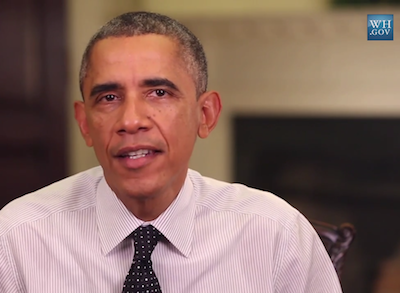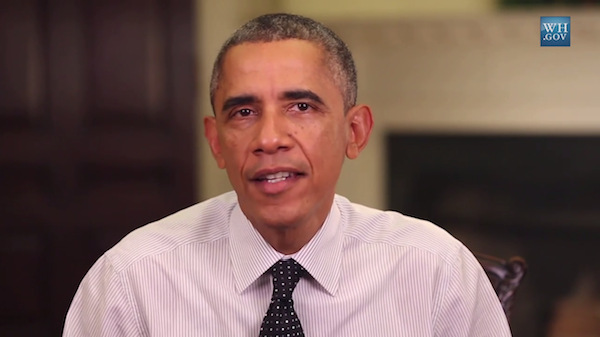What Obama's Net Neutrality Statement Means
After years of general statements encouraging net neutrality — the idea that Internet service providers (ISPs) should treat all Internet traffic equally — President Barack Obama today (Nov. 10) came out definitively in favor of the cause, in both written and video statements. Is this a toothless pronunciation by a second-term president whose party just lost control of the Senate? Or does he have solid legal rationale and authority to back up what he said? It may be a little of both.
Obama's roughly 1,100-word statement is carefully constructed around esoteric excerpts from U.S. telecommunications law and recent legal precedent. It's worth reading the full statement on the White House's website. But to put it in context, take a look at this deconstruction of the legal background for the most important statements.
MORE: What Is Net Neutrality?
The Law Behind the Speech
Obama's net neutrality statement is based mainly on two laws, two Federal Communications Commission (FCC) regulatory decisions and two court cases:
A 1980 FCC decision that Internet service could not be regulated as aggressively as telephone service
A policy that did the same for wireless service
The 2010 appeals court decision in favor of Comcast that struck down the FCC's original net neutrality policy
A nearly identical ruling by the same court in January 2014 in a suit brought by Verizon
Here are the key parts of Obama's speech, and what they mean:
Net Neutrality Rules
What Obama said:
"Four years ago, the FCC tried to implement rules that would protect net neutrality with little to no impact on the telecommunications companies that make important investments in our economy."
Background: This goes back to the FCC's 2010 Open Internet Order, which prohibited ISPs from blocking any "lawful content" or from "unreasonably discriminating" against lawful content.
Rules Overturned
What Obama said: "… the court reviewing the rules agreed with the FCC that net neutrality was essential for preserving an environment that encourages new investment in the network, new online services and content…"
Background: The "court" was the U.S. Court of Appeals for the District of Columbia in the 2010 Comcast case. The court agreed with the FCC's interpretation of Section 706 of the 1996 law, which said:
What the law says: "The commission … shall encourage the deployment on a reasonable and timely basis of advanced telecommunications capability to all Americans … by utilizing, in a manner consistent with the public interest, convenience and necessity, price cap regulation, regulatory forbearance, measures that promote competition in the local telecommunications market or other regulating methods that remove barriers to infrastructure investment."
Court's Opinion on Net Neutrality
What Obama said: "Unfortunately, the court ultimately struck down the rules — not because it disagreed with the need to protect net neutrality, but because it believed the FCC had taken the wrong legal approach."
Background: The FCC had sunk its own case way back in 1980, when it decided that data services, unlike telephone voice services, were not what Title II of the 1934 Telecommunications Act called "common carriers."
What the law says: "It shall be unlawful for any common carrier to make any unjust or unreasonable discrimination in charges, practices, classifications, regulations, facilities or services for or in connection with like communication service…"
What the court said: Thus, the court ruled that, as well-intentioned as the Open Internet Order and Section 706 of the 1996 law were, the FCC simply didn't have any authority to enforce them.
Even after that rather-clear ruling, the FCC didn't move to reclassify ISPs as common carriers, which it has the authority to do. Instead, it essentially made cosmetic changes to the Open Internet Order, which promoted a similar lawsuit by Verizon in late 2013. Again, the same D.C. Court of Appeals ruled in January 2014 against the FCC.
The common reaction was to say that the D.C. Court was against net neutrality. But, in fact, the opposite was true. The majority decision said that "..the [Federal Communications] Commission has adequately supported and explained its conclusion that, absent rules such as those set forth in the Open Internet Order, broadband providers represent a threat to Internet openness and could act in ways that would ultimately inhibit the speed and extent of future broadband deployment.
The Appeals Court goes on at length, agreeing with essentially all the FCC arguments about the dangers of ISPs discriminating against some content providers, even to support its own (such as a cable company slowing Netflix in order to benefit the cable company's pay-TV service).
MORE: Your Guide to Cable TV Cord-Cutting
But again, the court ruled that the FCC simply can't impose regulations if it doesn't first classify ISPs as common carriers. The court made it clear that the FCC could go back and classify ISPs as common carriers.
One thing the court did uphold in the January 2014 ruling was the FCC's requirement for transparency, saying ISPs have to "disclose the network management practices, performance characteristics, and terms and conditions of their broadband services." In other words, ISPs can discriminate against certain Internet content, but they have to tell you that they are doing so.
What the FCC said: After avoiding the classification of ISPs as common carriers, the FCC is now moving that way. In a May 15 FCC open meeting on net neutrality, FCC Chairman Tom Wheeler said that all options, including common carrier designation, were on the table. That of course, requires a majority of commissioners voting for the designation. With two generally in favor and two against, it comes down to Wheeler.
What Congress said: Technically, the FCC can make this designation without Congress, but the legislative body can pass additional laws or make amendments to undo the FCC action. The Republican House leadership is on the record against common carrier designations, based on a May 2014 letter to Tom Wheeler from Speaker John Boehner and the House Republican leaders.
Obama's Authority Over the FCC
What Obama said: "The FCC is an independent agency, and ultimately, this decision is theirs alone."
Background: That's true, but Obama certainly has clout. He appointed Wheeler to the FCC in November 2013. And the four other FCC commissioners are split evenly between conservatives who are against the common carrier designation and two liberals who are in favor of them.
What the FCC said: A few hours after Obama's statement today, Wheeler put out his own statement of support, saying, "Like the president, I believe that the Internet must remain an open platform for free expression, innovation and economic growth… The Internet must not advantage some to the detriment of others."
However, he also made it clear that he won't be taking orders from the president. "I am grateful for the input of the president and look forward to continuing to receive input from all stakeholders, including the public, members of Congress of both parties, including the leadership of the Senate and House committees, and my fellow commissioners," Wheeler said.
MORE: 5 Freedoms You'll Lose Without Net Neutrality
Obama's 5 Net Neutrality Principles
Finally, Obama lists four "bright-line rules" that ISPs should follow, most of which conform to what Wheeler and the two liberal members of the FCC support:
1) No Blocking
What Obama said: "If a consumer requests access to a website or service, and the content is legal, your ISP should not be permitted to block it."
What the law says: This harkens back to the 1934 rule against "unjust or unreasonable discrimination," but that applies only to common carriers.
2) No Throttling
What Obama said: Nor should ISPs be able to intentionally slow down some content or speed up others — through a process often called "throttling" — based on the type of service or your ISP's preferences.
What the Law says: Same as above.
3) Transparency
What Obama said: "[ISPs should] increase transparency. The connection between consumers and ISPs — the so-called "last mile" — is not the only place some sites might get special treatment. So, I am also asking the FCC to make full use of the transparency authorities the court recently upheld and, if necessary, to apply net neutrality rules to points of interconnection between the ISP and the rest of the Internet."
Background: This one is interesting. It addresses how ISPs might be throttling not only service to consumers, but the ISPs' own connections to the massive Internet backbone providers such as Level 3 that link ISPs, carrying Internet traffic across and between continents. In May, a Level 3 executive wrote that he believes ISPs have, in fact, been throttling.
4) No Fast Lanes
What Obama said: No paid prioritization. Simply put: No service should be stuck in a "slow lane" because it does not pay a fee.
What the FCC said: Wheeler now says he is against fast lanes, and provided support in his statement today. "We cannot allow broadband networks to cut special deals to prioritize Internet traffic and harm consumers, competition and innovation," he said.
5) Regulate Wireless Internet
Obama also noted that wireless Internet should be regulated to ensure net neutrality:
What Obama said: "The rules also have to reflect the way people use the Internet today, which increasingly means on a mobile device. I believe the FCC should make these rules fully applicable to mobile broadband as well, while recognizing the special challenges that come with managing wireless networks."
What the FCC said: Even in the Open Internet Order, the FCC decided that wireless Internet was a less mature technology and industry and therefore should be regulated more lightly.
What Obama Can Do
Obama, who is approaching the end of his term and whose party is the minority in Congress, has no concrete authority on net neutrality laws, especially under an independent agency like the FCC. But he is still the president, so he does have some influence, and he's coming out in favor of a cause that many citizens support. No one wants their Netflix to stall out.
Senior editor Sean Captain prefers his Internet to be like his local convenience stores: always open. Follow him @seancaptain and on Google+. Follow us @tomsguide, on Facebook and on Google+.
Copyright 2014 Toms Guides , a TechMediaNetwork company. All rights reserved. This material may not be published, broadcast, rewritten or redistributed.





